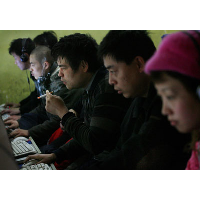Chinese Internet Goes Down after Release of Details of Corruption of Government Leaders
 (AP Photo)
(AP Photo)
In what’s been described as the biggest online outage in history, China’s Internet went completely down Tuesday afternoon. Theories have abounded since as to what caused it, and whether the crash was intentional on the part of the Chinese government to block citizens from seeing a controversial news story on the nation’s leadership and their offshore bank accounts.
The historic outage, which affected about 500 million Chinese, began at 3:30 pm local time on January 21, according to GreatFire.org, a group that monitors China’s efforts to censor Internet information.
The online blackout lasted only about an hour. But the timing of the event coincided with a story published that same day at 4 pm (China time) by the International Consortium of Investigative Journalists (ICIJ).
That story reported on dozens of political leaders and wealthy individuals who have maintained tax havens outside China, a possible indication of corruption.
“Internet censors prevented readers in China from seeing investigative stories by the International Consortium of Investigative Journalists and several of its publishing partners, including Spain’s El País, Le Monde, Süddeutsche Zeitung in Germany, the Canadian Broadcasting Corp., and the U.K. and U.S. editions of The Guardian,” ICIJ reported the next day.
Other sources reported the outage lasted much longer.
Nicole Perlroth of The New York Times wrote that many users couldn’t access the Internet for up to eight hours.
The Times account focused on the Great Firewall, a nickname for the army of censors and technology employed by Beijing to control what Chinese see online.
Perlroth said the censorship system “mistakenly” redirected the country’s traffic to several websites “normally blocked inside China, some connected to a company based in the Wyoming building.”
That company, Sophidea, is based in Cheyenne, Wyoming (“at least on paper”). Perlroth said she couldn’t corroborate whether Sophidea’s servers were actually in Wyoming.
It is speculated that a little brick residential house in Cheyenne could be the site of that company. The former tenant, Wyoming Corporate Services, had about 2,000 businesses registered to the location, and they included some curious customers. Among them was a government contractor who sold counterfeit truck parts to the Pentagon, a jailed former Ukraine prime minister, and someone who masterminded the evasion of gambling restrictions for online poker players.
Wyoming Corporate Services, which is now located 10 blocks away from its original site, claims that Sophidea is currently one of the firm’s 8,000 registered businesses. Its operations reportedly involve the rerouting of Internet traffic for the purpose of shielding an individual’s true location.
If much of China’s Internet traffic was redirected to Sophidea’s servers, they would have crashed instantly from overload. But that would only account for some of the Asian giant’s online population that found itself stranded.
The Times story also reported “a separate wave of Chinese Internet traffic Tuesday was simultaneously redirected to Internet addresses owned by Dynamic Internet Technology (DIT), a company that helps people evade China’s Great Firewall, and is typically blocked in China.” DIT’s clients include Radio Free Asia, Voice of America, and Human Rights in China.
For that one day, the event had global ramifications, according to Compuware APM’s Heiko Specht. “When you consider the population affected, this was one of the biggest outages we've ever seen, with one seventh of global Internet users impacted,” he said in an email to eWEEK. “However, the impact wasn't just on Chinese internet users; companies around the world could have lost potentially $200 million in online sales during the eight hour period.”
-Noel Brinkerhoff, Danny Biederman
To Learn More:
Big Web Crash in China: Experts Suspect Great Firewall (by Nicole Perlroth, New York Times)
DNS Poisoning Suspected Cause of Huge Internet Outage in China (by Sean Michael Kerner, eWeek)
Internet Outage in China on Jan 21 (by Percy, GreatFire.org)
“Chinaleaks” Stories Censored in Mainland China (by Michael Hudson, Marina Walker Guevara and Alexa Olesen, International Consortium of Investigative Journalists)
China: Who Uses Offshore Tax Havens (by Chris Zubak-Skees, International Consortium of Investigative Journalists)
- Top Stories
- Unusual News
- Where is the Money Going?
- Controversies
- U.S. and the World
- Appointments and Resignations
- Latest News
- Musk and Trump Fire Members of Congress
- Trump Calls for Violent Street Demonstrations Against Himself
- Trump Changes Name of Republican Party
- The 2024 Election By the Numbers
- Bashar al-Assad—The Fall of a Rabid AntiSemite






Comments